Cover Photo.A young Kamala Harris at her mother Shyamala Gopalan's laboratory at UC Berkeley. Harris used a personal story about her experience with a school busing program in Berkeley in a breakout moment at Thursday night's presidential debate. (Courtesy of Kamala Harris)
BERKELEY — When Kamala Harris got on a Berkeley school bus for the first time five decades ago, she was taking part in one of the nation's earliest efforts to use busing to integrate public schools. The yellow bus took her up from her home in the flatlands to Thousand Oaks Elementary at the base of the hills, linking neighborhoods that were cleaved by race and income.
Now, Harris has turned that experience into a breakout moment for her presidential campaign. Her show-stopping confrontation with frontrunner Joe Biden in Thursday night's debate over his history of opposing busing programs instantly reshaped the race for the Democratic nomination.
The moment resonated especially deeply with former Berkeley students who, like Harris, had experienced busing and were watching Thursday night."She was spot-on," said Doris Alkebulan, 58, who was among the first black students bused to white schools during the city's 1967 pilot program. "It gave me such joy and pride that I still have confidence in our country."
A FiveThirtyEight and Morning Consult poll conducted before and after the two nights of debates showed Harris rising from 7.9 percent to 16.6 percent and Biden falling from 41.5 percent to 31.5 percent. The post-debate poll still had Biden, who is in the Bay Area for private fundraisers this weekend, leading the field. But Harris had vaulted over Sen. Elizabeth Warren into third place and was less than a percentage point behind Sen. Bernie Sanders.
Just a few years after Harris got on her first school bus, Biden was arguing against busing, calling the concept "asinine" and fighting efforts in the Senate to impose it around the country.
Harris, the only black candidate on the debate stage, highlighted that record in raw and personal terms, leaving the former vice president rattled and his sheen of frontrunner status damaged.
"It was hurtful to hear you talk about the reputations of two United States senators who built their reputations and career on the segregation of race in this country," the California senator said, referring to his recent, controversial comments about his partnership with former Sens. James O. Eastland and Herman Talmadge, as she turned to look straight at Biden. "It was not only that, but you also worked with them to oppose busing."
"There was a little girl in California who was part of the second class to integrate her public school and she was bused to school every day," Harris continued, with the debate hall pin-drop silent. "And that little girl was me."
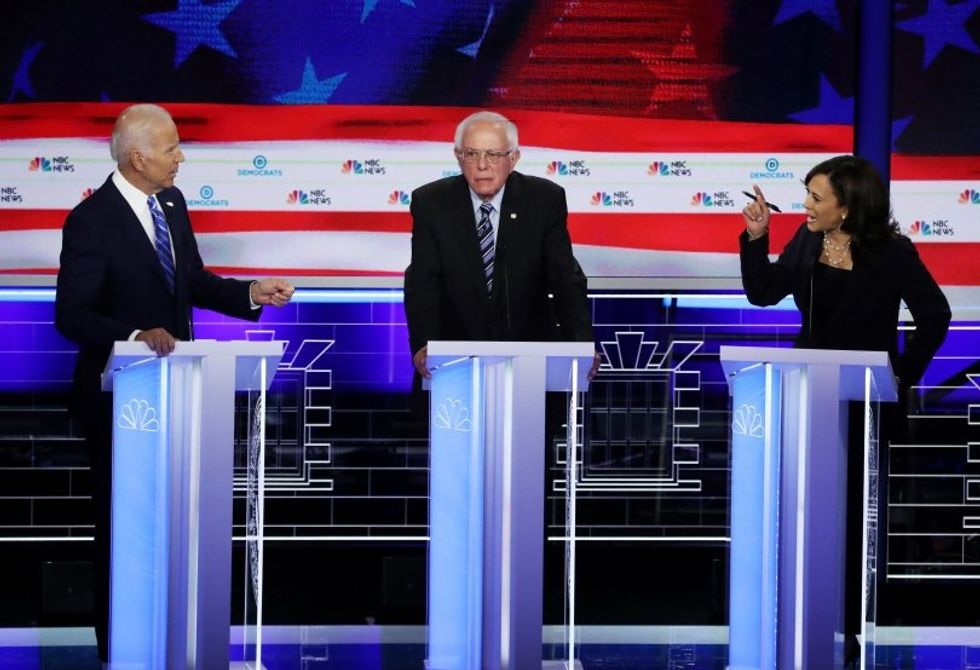
The five-minute exchange appeared to be the most significant of the 2020 campaign so far, with commentators across cable news and social media declaring Harris a runaway debate winner and calling into question Biden's position atop more than two dozens Democratic hopefuls. Harris' attack took aim at a key constituency she and Biden are both fighting for support among, older African-American voters, and seemed likely to deflate the long-standing criticism of her as too cautious.
Harris' campaign took quick advantage of the attention, blasting images of a young Harris across social media and adding a $29.99 "That Little Girl Was Me" T-shirt with her childhood photo to the campaign merchandise store.
Alkebulan said the Facebook group for her Berkeley class was blowing up Thursday night with former students amazed at Harris' performance, and she sent Harris an online contribution right after the debate. Getting to go to Cragmont Elementary was a transformative opportunity, she said, with the times tables she learned there setting her on the path to becoming an engineer.
"I still remember it so clearly — I can still hear the sound of the bus," she said.
Berkeley Unified School District started voluntarily busing its elementary students on a widespread level in 1968, under the direction of a progressive superintendent, Neil Sullivan. Black students would be bused up to the white schools in the hills during kindergarten through third grade, and white students went down to schools in the flatlands for grades 4 through 6. The program was one of the first of its kind in the country and was praised by Martin Luther King, Jr. — who was assassinated that year — and other civil rights leaders.
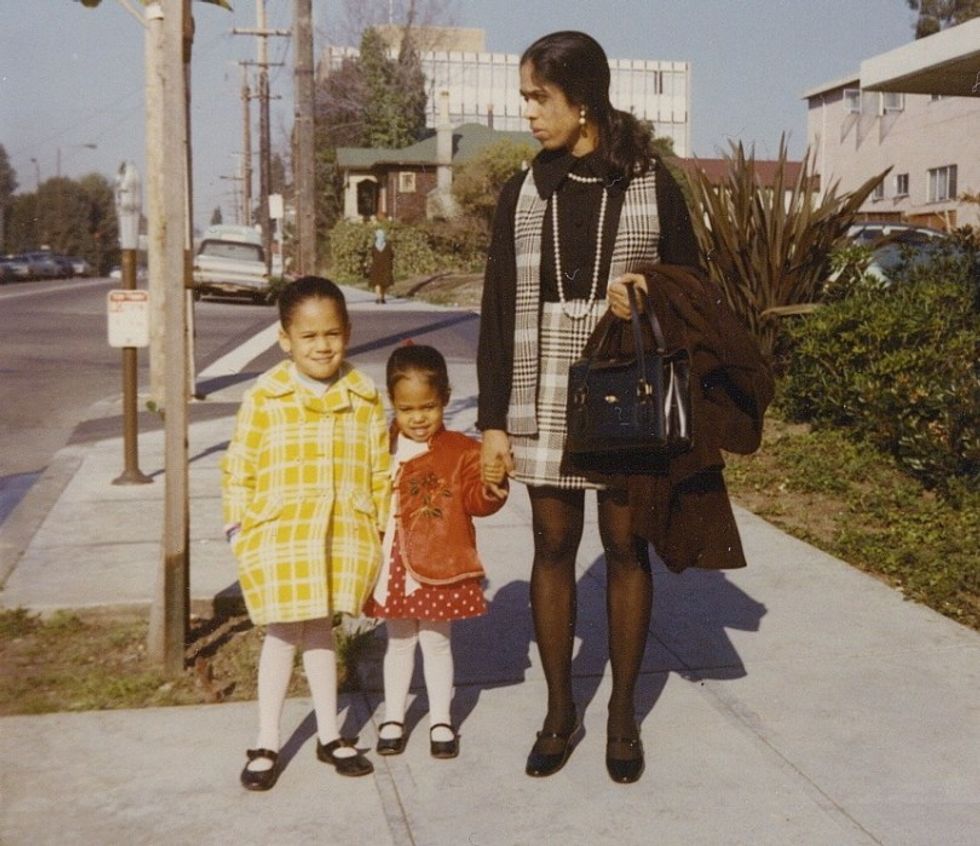
A member of the second class to go into the program, Harris took the bus every day from her mother's yellow duplex on Bancroft Way in the more diverse, less affluent flats of northwest Berkeley up to Thousand Oaks elementary in a wealthier and whiter neighborhood at the edge of the hills.
Harris started the busing program as a kindergartener in 1969, Berkeley school officials confirmed. Her parents were UC Berkeley grad students and immigrants from India and Jamaica who were deeply involved in the civil rights movement, and the family lived on Bancroft Way in a redlined area of Northwest Berkeley. The busing program took Harris to a school that previously had been more than 90 percent white, in a neighborhood where her family would likely have only recently been blocked from buying a home.
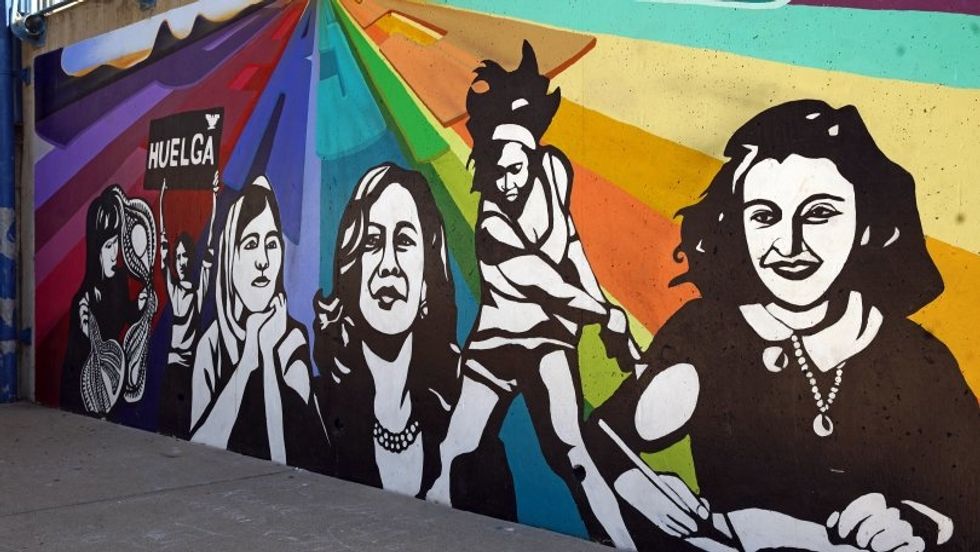
"I only learned later that we were part of a national experiment in desegregation," Harris wrote in her recent memoir. "At the time, all I knew was that the big yellow bus was the way I got to school."
Her first-grade class was a pioneering picture of diversity, from students who grew up in public housing to the children of UC Berkeley professors, she wrote. Going to Thousand Oaks had a profound impact on her life: Her first-grade teacher, Frances Wilson, showed up to Harris' law school graduation two decades later, a story she often tells voters on the campaign trail. (Harris, her mother and sister later moved to Montreal when she was in middle and high school.)
Judy Robinson, whose mother often took care of Harris and her sister and dropped a young Harris off at her bus stop in the morning, said she wasn't surprised the senator's debate performance made waves.
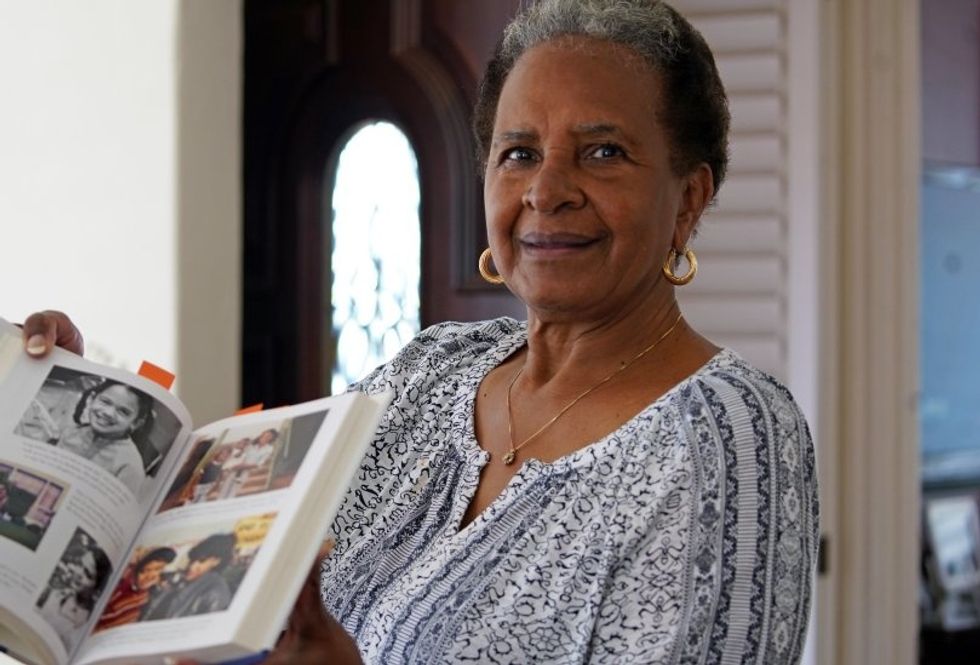
"She was that little girl — I remember it like yesterday," Robinson, 73, said Friday with a laugh on the steps of her house two doors down from Harris' childhood home. "What I saw was, that's Kamala. Go, girl!"
Research has shown that busing and similar integration policies can have generations-long positive impacts on students, experts say, with African-American students benefiting from better educational and job attainment and students of all races — including white students — becoming less likely to form racial prejudices.
During the debate over Justice Brett Kavanaugh's confirmation last year, Harris argued that school integration was a big factor in the fact that she was able to become a prosecutor and eventually run for public office.
"I wouldn't be part of Kavanaugh's confirmation hearings had Chief Justice Warren not been on the Supreme Court to lead the unanimous decision in Brown v. Board," Harris tweeted last year. "Had someone else been there, I may not have become a U.S. Senator."
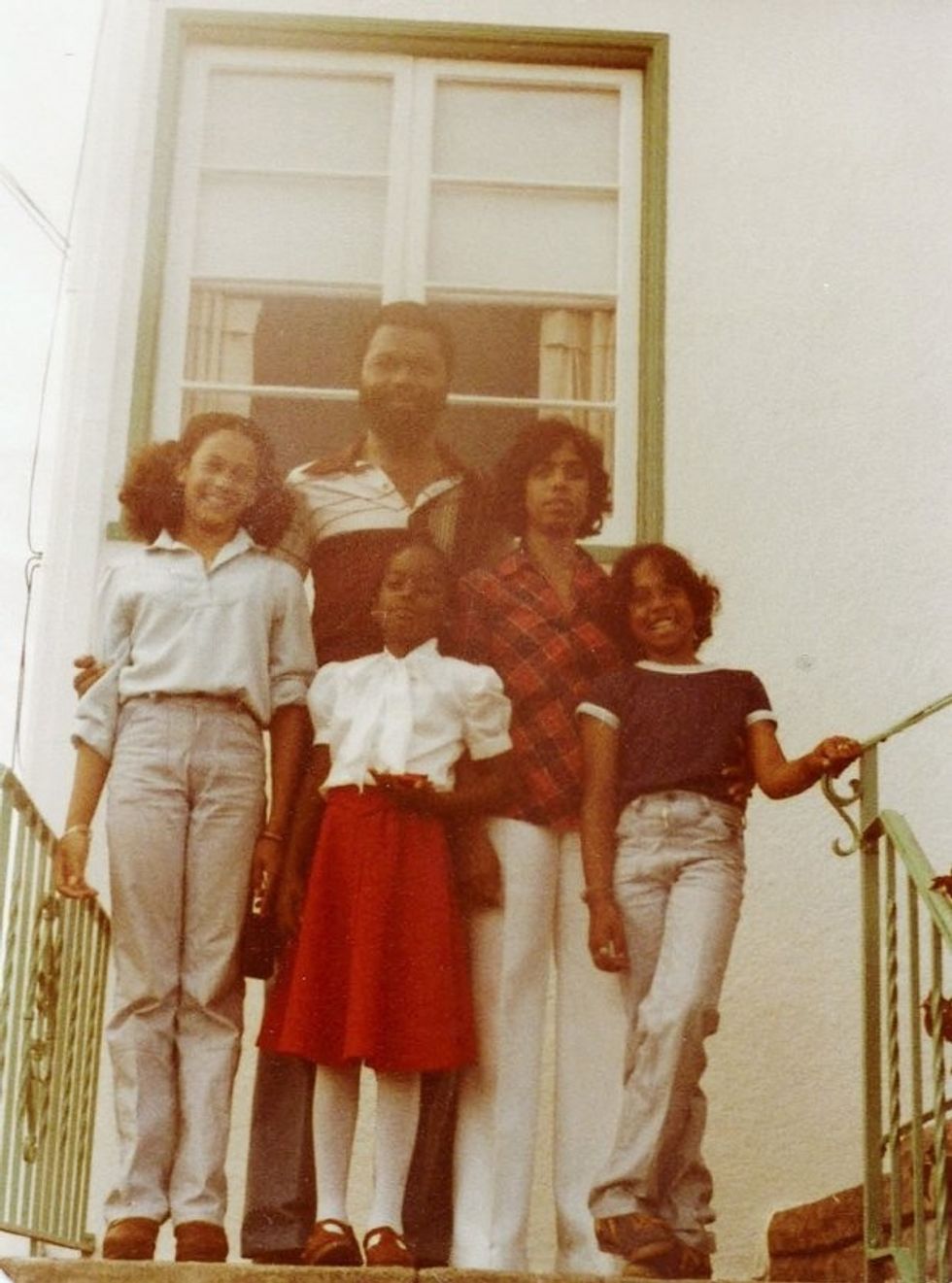
Berkeley's plan was highly controversial at the time, provoking an unsuccessful attempt to recall the school board, and some white families left the district for private schools or elsewhere in the Bay Area.
"Oftentimes, the burden of how busing is used fell on African Americans when integration happened," said Erica Frankenberg, a professor of education at Penn State University, who has studied integration efforts in Berkeley and other school districts. "What Berkeley recognized is that it was important to share that, that white students needed to go to black schools as well."
Biden took office as a senator from Delaware in 1973, just four years after Harris' first experience with busing, and he was a staunch opponent of using the practice for desegregating public schools. That put him in line with prevailing public opinionat the time: A 1973 Gallup poll found just 5 percent believed busing was the best means to desegregate public schools — and only 9 percent of African-Americans were in favor.
In 1975, Biden authored a successful anti-busing measure that blocked federal grants to public schools that would use the money "to assign students or teachers by race." He flatly told a local newspaper in an interview that year that "I oppose busing," calling it an "asinine concept."
The following year, Biden introduced a proposal to block the Justice Department from using busing to desegregate schools, and in 1977 introduced a bill opposing court-ordered busing. That legislation, which didn't pass, was supported by Eastland— the segregation-backing Mississippi senator who Biden has talked about working with in recent weeks.
In the debate Thursday, Biden defended himself by saying Harris was mischaracterizing his position, declaring, "You would have been able to go to school the same exact way because it was a local decision made by your city council." He said he was opposing efforts to get the federal government to impose busing on school districts.
Not everyone who went through the Berkeley busing program was impressed with Harris' broadside. Brandon Baum, a white lawyer who credits the program for helping him build a multicultural friend group he's still close with today, said he didn't fault Biden for representing the will of his Delaware constituents at the time.
"I don't think (Biden is) a racist, and I hate to see Democrats attacking each other in this manner," Baum, 59, said. "We know who's going to be throwing a lot of mud pretty soon, and I'd like to see us take a higher approach."
Today, debates over school segregation and integration programs still roil cities around the country. Berkeley got rid of its busing program in the 1990s, and now has a different school system based on neighborhood.
Mercury News, June 28, 2019. Updated, June 30, 2019
###
July 1, 2019
Voices4America Post Script. Kamala Harris raised the important issue of busing and race at the 2nd #DemDebate. Yes, that little girl was her.
This is the story behind the Debate.
Biden was not up to being challenged.
I am with Matthew Dowd on this.
Would Biden be able to debate Trump? Would Kamala?
The public seems to have decided. Senator Harris moved to 3rd place in the polls, as Biden’s numbers slid. She also raised $2 million in 24 hours after the debate.
#Kamala4thePeople


